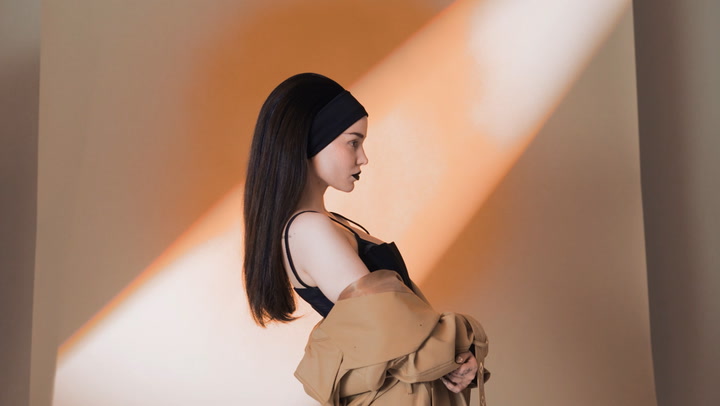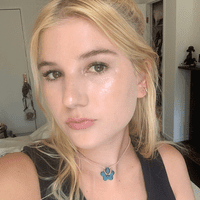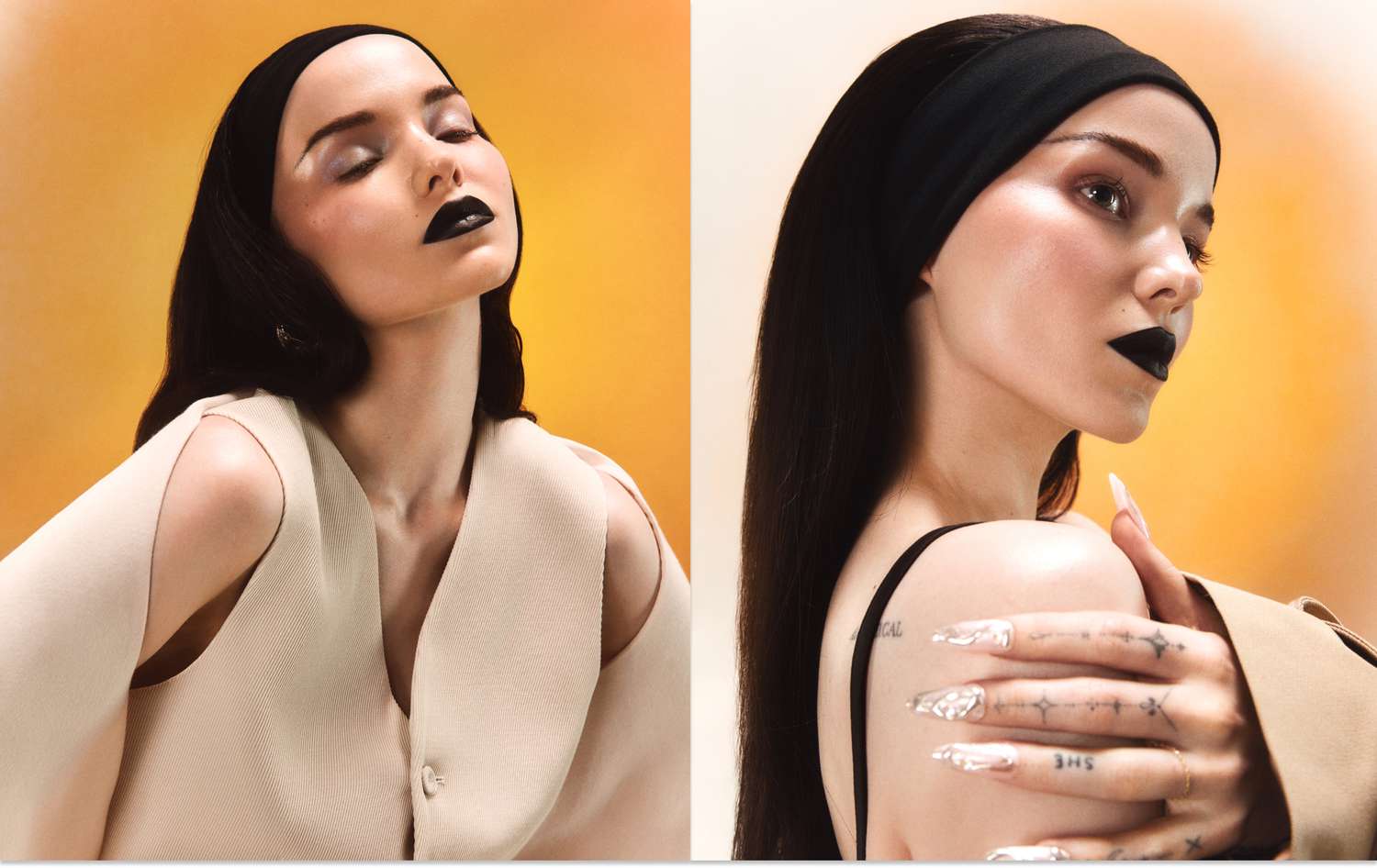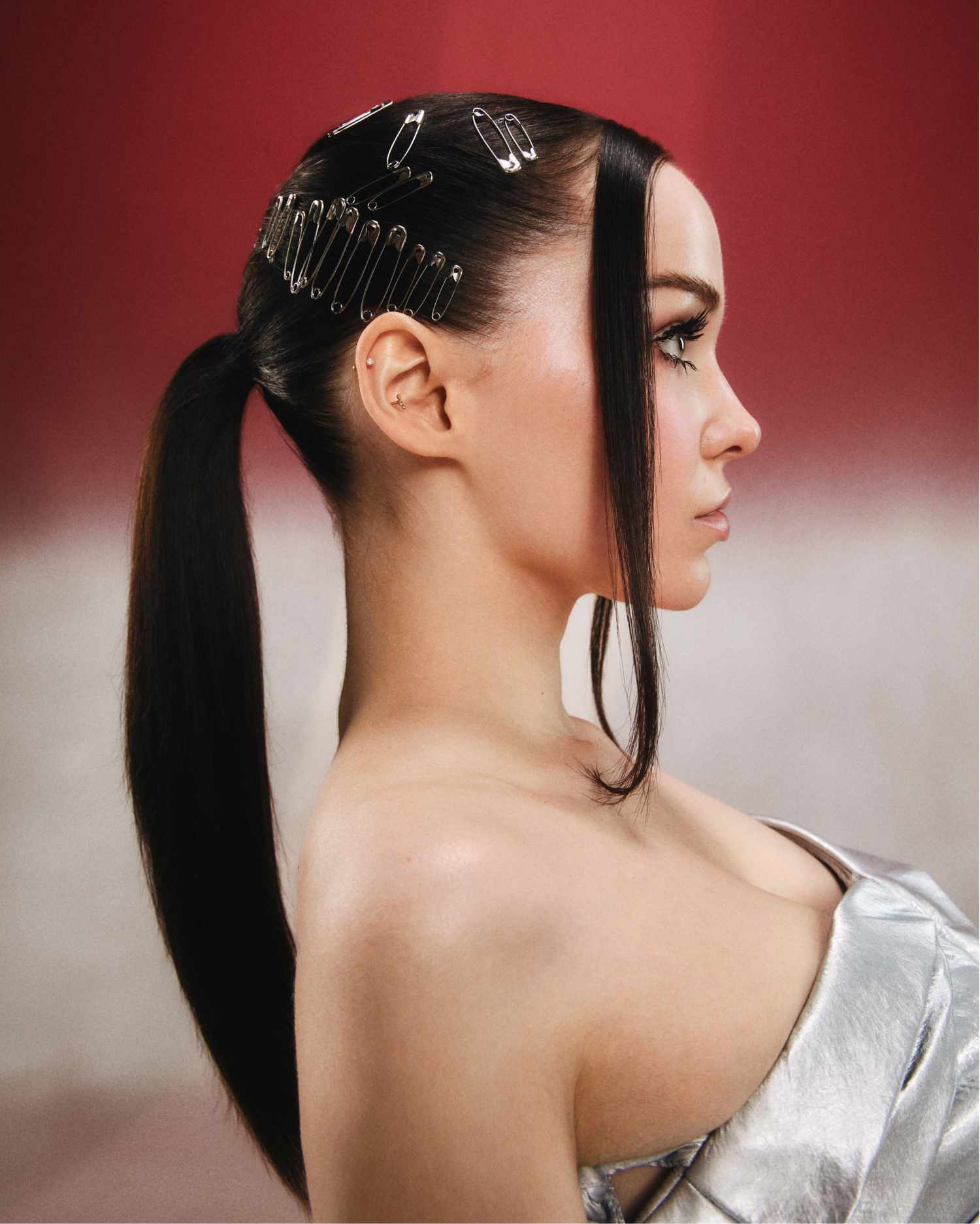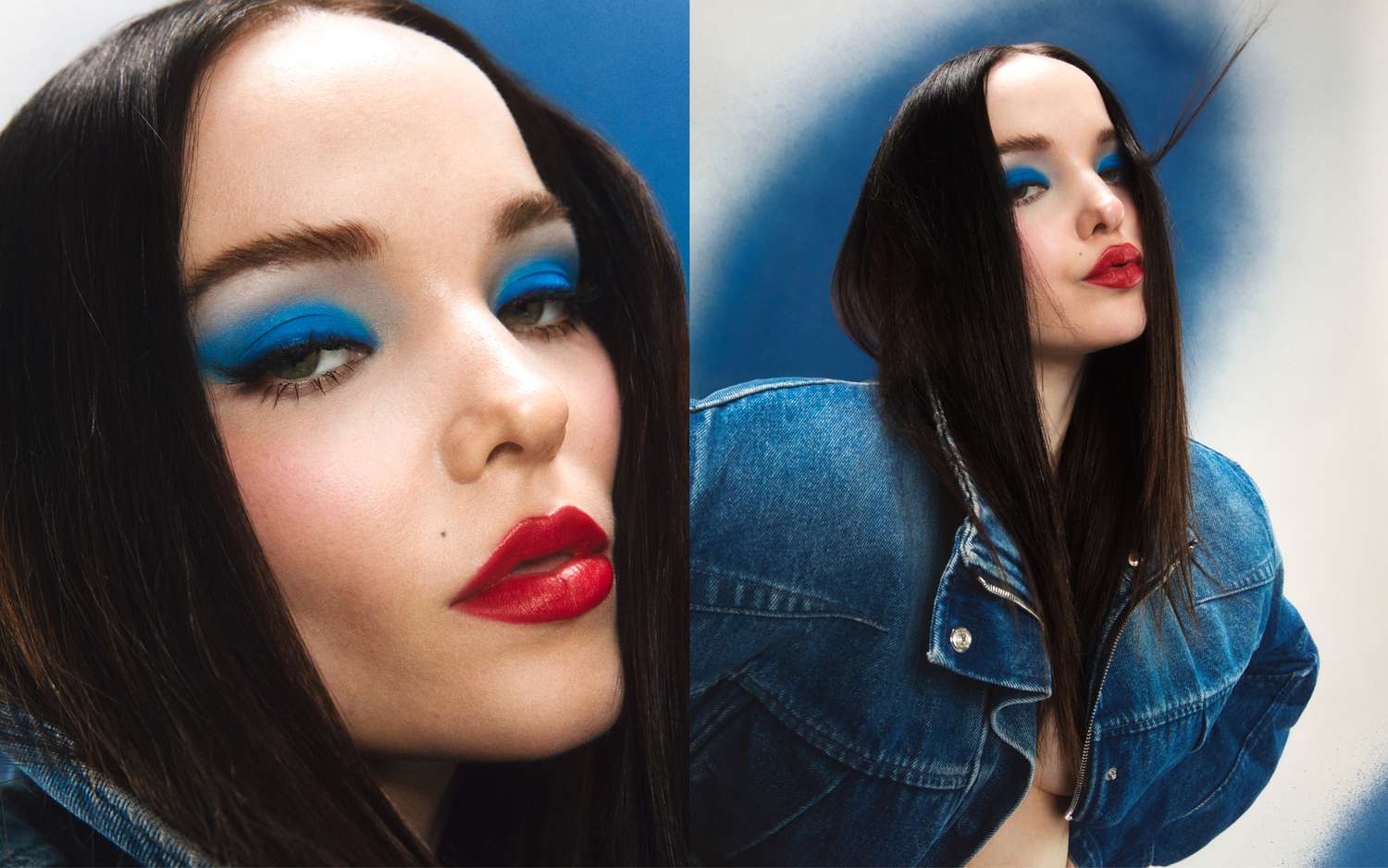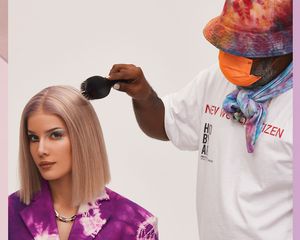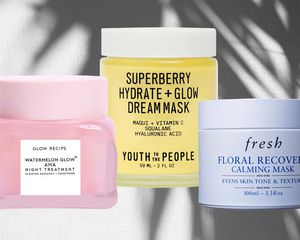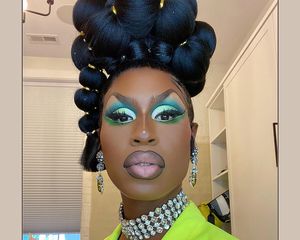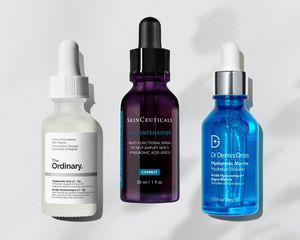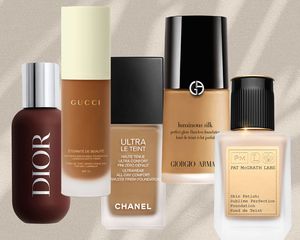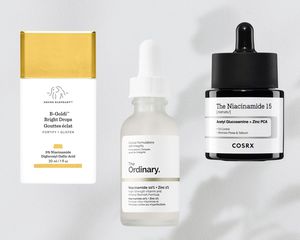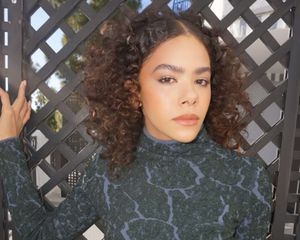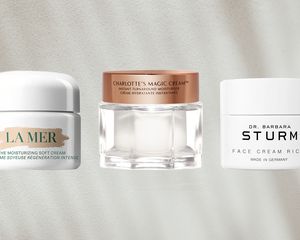I have one question saved for Dove Cameron, but she beats me to it just minutes into our Zoom interview. Moments after we bond over the mutually messy state of our rooms (she’s in the middle of a massive cleaning and redecorating spree; I just live like this), she asks me for my star sign. When I answer Taurus, she basically squeals in delight. Dove is a Capricorn—an earth sign, just like me—and that means we’re fated to be best friends. It also means she’s a sensitive perfectionist and chronic overachiever, two personality traits that almost seem like prerequisites for someone who had reached mainstream success by her fourteenth birthday.
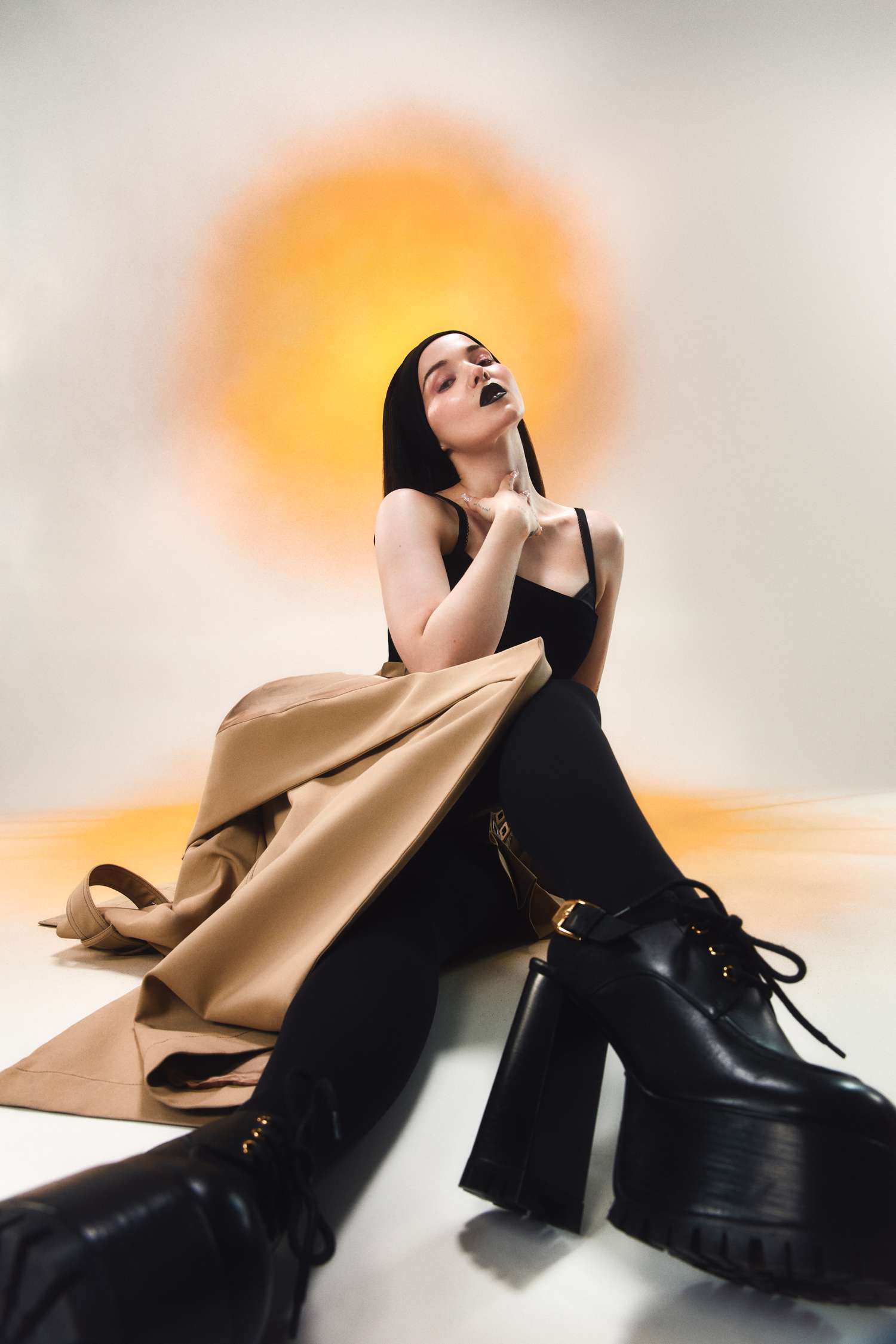
Outfit: Dion Lee; Tights: Wolford; Shoes: Versace
Cameron made me feel at ease from the jump. She Zooms in from her home in L.A., wearing a black crewneck sweatshirt and cat-eye glasses. It appears she has zero makeup on, and her dark hair is slicked back in a bun. She has a musical way of speaking—when she shoos her cat away from drinking a friend’s matcha, she literally sounds like a Disney princess—but is as open about the darker parts of her life as she is about her star sign.
When we connected, Cameron’s been getting her house in order ahead of her album release later this fall following a catchy instant hit with Marshmello, “Other Boys,” which came out earlier this month.
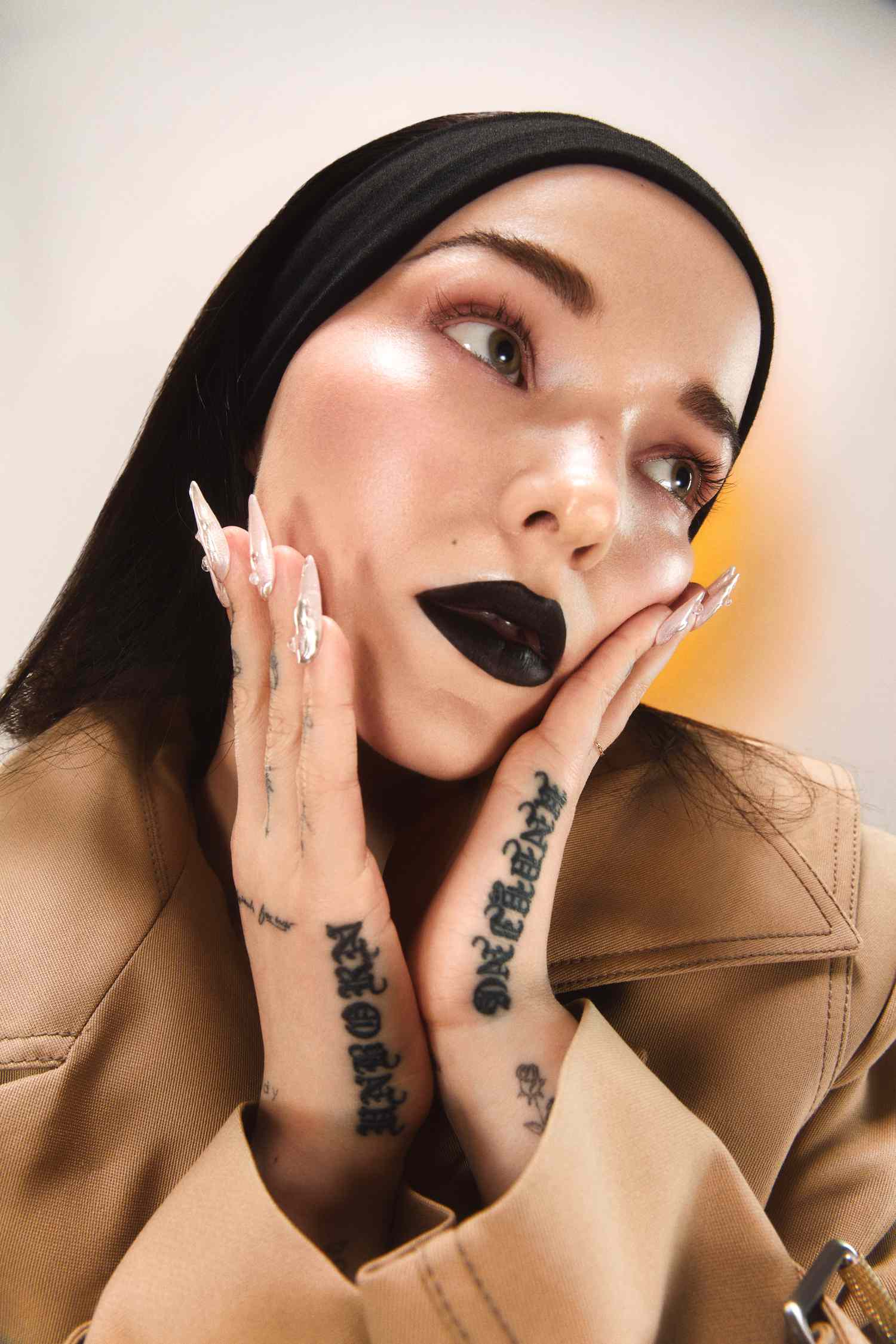
Lip: Make Up For Ever Artist Color Pencil in Whatever Black; Skin: Shiseido Synchro Skin Self-Refreshing Concealer
Like any good Capricorn, she has two modes of operation. In one, she’s all work, “sleeping four hours a night and drinking more coffee than anyone ever should.” That’s how she’s been for most of her adult life, juggling multiple projects at once. “Unless everything is going perfectly and nothing slips through the cracks and I have my hands all over everything; unless I feel like I’m at death’s door, I’m not doing enough, according to me,” she says, again blaming her sign. “That’s just not how I want to live. That’s not going to be sustainable.”
And then, like this summer, there are times when she hibernates from Hollywood to make up for all that time hustling. “I really intuitively [felt] like I need[ed] to just go away,” she says. “To see my friends for the first time in two years, I need to try to actually make a home and put things up on my walls. [I’d] been living in a sort of transitory period now for four years, and I loved it, but I just decided it had to come to an end.”
By removing everything, “extracurricular,” as she puts it, off her plate—posting on socials, red carpet appearances, and non-music-related projects—she was able to fully and completely focus on her debut album in a way she’s never been able to before, thanks, in part, to granting herself the power to be her own creative director of the project. “I wanted to look back and be like, ‘There was not one decision made by someone else or because I had no time.’ I wanted to really focus on this, and so I’ve spent the better part of the last three months trying to get back to who I was before I started working professionally and make decisions from that point of view.”
Outfit: Fendi; Earrings: Letra
This summer, she spent her downtime attempting to reconnect with her pre-fame self and indulging in her sad-girl tendencies while “laying down and crying a lot or writing a lot of poetry.” She tried to work through some past trauma, but mostly, the break meant listening to her body and resting or listening to her soul and seeing friends. “It’s just so funny the wisdom the body has and the wisdom your instincts bestow upon you to get you back to ([or] at least closer to) center. Because we’re always finding who we are, quote-unquote, forever until we die.”
Early on in our chat, Cameron jokes she “can’t do a single interview without bringing up the fact that I just have so much unprocessed trauma, so much loss.” She says it with a laugh, but trauma and the unraveling of it come up time and again in our conversation.
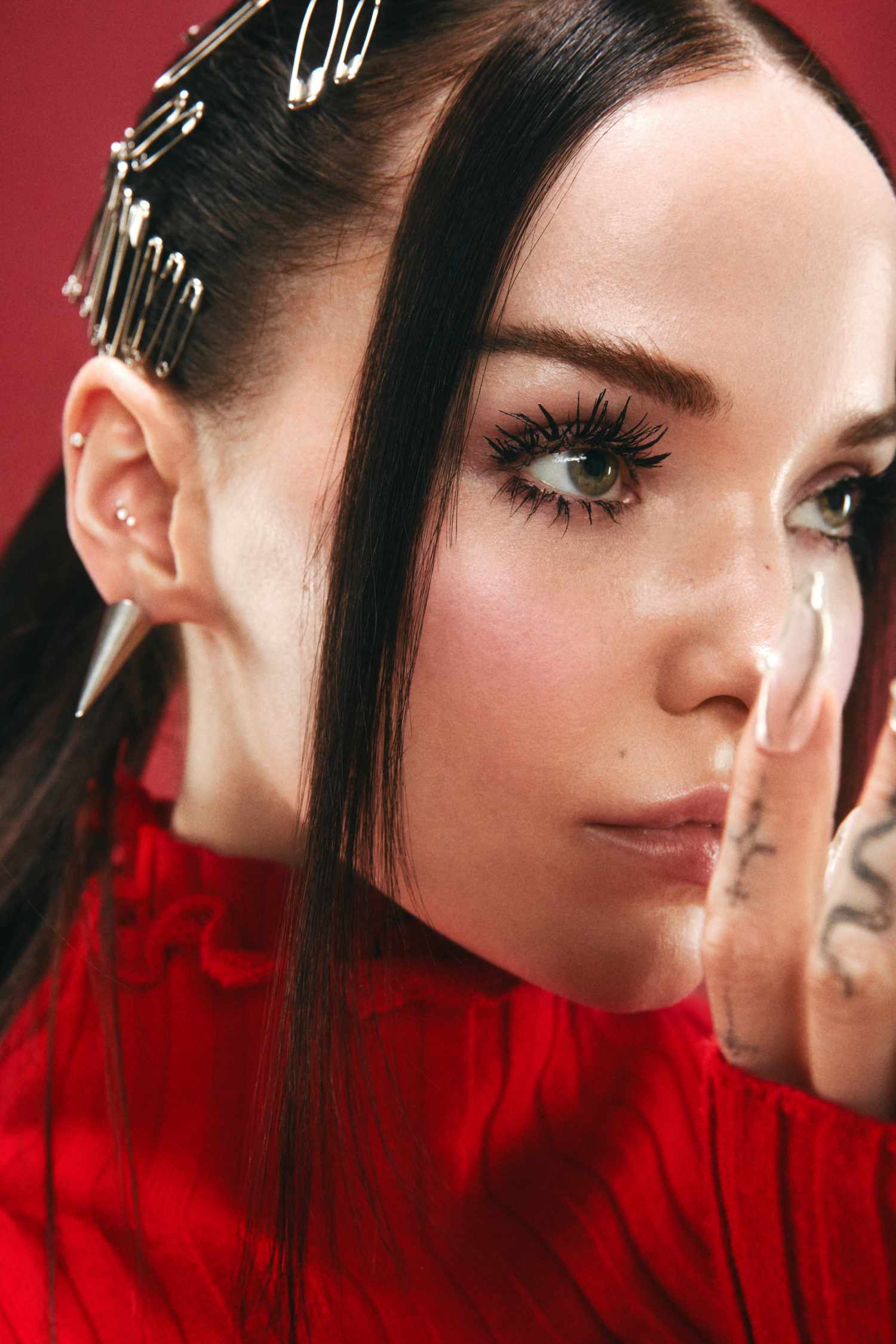
Dress: Fendi; Earrings: Acne
Cameron has been called “resilient” hundreds of times over the course of her life—by the press, family, friends, and well-meaning Instagram commenters. But despite any good intentions, it always rubbed her the wrong way. “Over time, it started to feel disempowering,” she says, adding that it’s a word we inequitably pin on women, typically those we see as victims. “It’s like, ‘So many things have been done to you, but look at what you did with it!’ It’s this pressure to always be okay, to survive it. I was just so tired of the look people gave me when they said how resilient I was.”
At first, “resilient” certainly seems like the right descriptor for Cameron. She mentioned that a day before her Byrdie cover shoot, she had an unexpected health scare and wasn’t feeling her best when she arrived on set. Looking at the photos, you would never know it, as she posed in sky-high heels, did backbends in Dion Lee, and wore pounds of safety clips in her hair with ease.
But for Cameron, it’s less about bouncing back from trauma and more about letting it transform her. Instead of resilient, she offers up another word: “alchemical,” which she has tattooed on both shoulders, one side in English and one in Hindi, as a reference to her childhood spent in India. It comes from alchemy, the witchy predecessor of chemistry, that focuses on the process of transformation. It also happens to be the title of her debut album.
“It’s like, next to resilience, but you are the doer,” she says of the distinction. Instead of going back to the baseline of being okay or rebounding to a pre-trauma state, Cameron prefers to roll with how these events changed her. She explains that she likes to imagine every bad thing that happens to her as a talisman in her house, and instead of shoving them away and feeling their presence looming, she eats them and gets bigger and better (like I said, it’s a little witchy).

“Instead of having them be something that was done to me; me surviving something, I was now in the driver’s seat. I was somebody who had all of these experiences in my nervous system, in my spirit, [and] in my blood, and I could do with them what I wanted. I could release them. I could turn them into something gorgeous.”
The “something gorgeous” in question this time around is her debut album, which serves as an introduction to the singer after a handful of singles.
This theme of transformation and rebirth follows Cameron throughout her life. She experienced more grief by the time she was in high school than many of us do in a lifetime—her childhood best friend was tragically murdered when Cameron was just 8 years old, and her father died by suicide when she was 15. Still, she was able to transform that heartbreak into a dream role as the titular twins on Disney Channel’s Liv and Maddie in 2013 and even won an Emmy for her performance.
It’s a time-honored tradition for Disney stars to transition into a music career in adulthood, one Cameron says she was aware of even at the age of 14. While she formerly positioned herself as a true-blue musical theater girl in recent years—a label that still sticks thanks to her most recent role in Apple TV’s Schmigadoon!—she says music was always the plan. She understood Disney was the perfect training ground (she calls it “Disney College”) to teach her everything she needed to know about breaking into the industry.
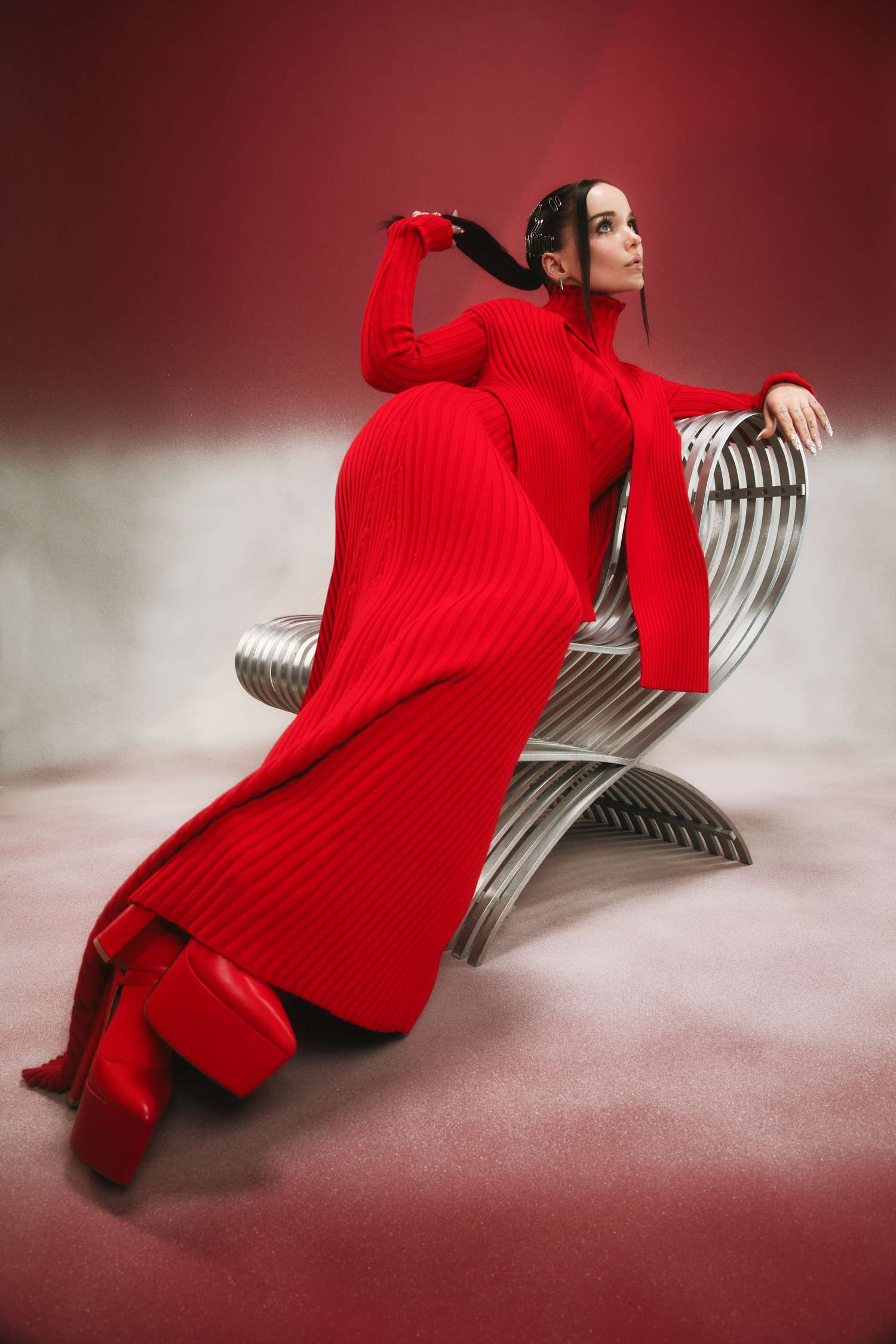
Dress: Fendi; Shoes: Andrea Wazen
When Cameron signed with Disney, she had bright blonde hair and wore pastel dresses with Peter Pan collars to press events. She was also 15 and just beginning to discover who she was. “It wasn’t like I was sitting there covering up this tattooed, queer, villainy thing. I had no idea who I was going to develop into. And so it really wasn’t much of a political statement to wear pink dresses and have blonde hair.”

After parting ways with Disney in her early twenties, she made another transformation, and this time, she became a full-blown pop star. The shift is notoriously rocky, but Cameron made it look easy by comparison. Because she had already been through so much, growing up in the public eye was hard, but not as difficult as you would expect, says Cameron, and she was ready to make the jump in 2019 after the third Descendants movie. She had few scandals compared to the previous Disney generation, save for two public breakups and criticism for a braless selfie when she was 23. For a year or two following her departure from Disney, she kept her image pretty stagnant—her hair got even blonder, she released a few classic pop songs, and she nabbed high-profile theater roles playing good girls in Hairspray Live! and Mamma Mia! at the Hollywood Bowl.
After accusations of queerbaiting in 2020, she publicly came out on Instagram Live—she previously identified as bisexual but prefers queer now—and dropped her biggest hit to date, “Boyfriend,” which skyrocketed her to number one on Billboard’s Emerging Artists charts and earned her Best New Artist at the MTV VMAs.
Shortly after coming out, she transformed again. Or, at least, that’s how it appeared to the public. Her bright blonde hair was traded in for a dark brunette—later becoming inky black and “cherry cola” red—and tattoos started popping up left and right. Gone were her hot-pink crop tops and swishy circle skirts, and in came leather harnesses and Iris van Herpen gowns. On social media, moody selfies and an openness about her struggles with mental health followed.
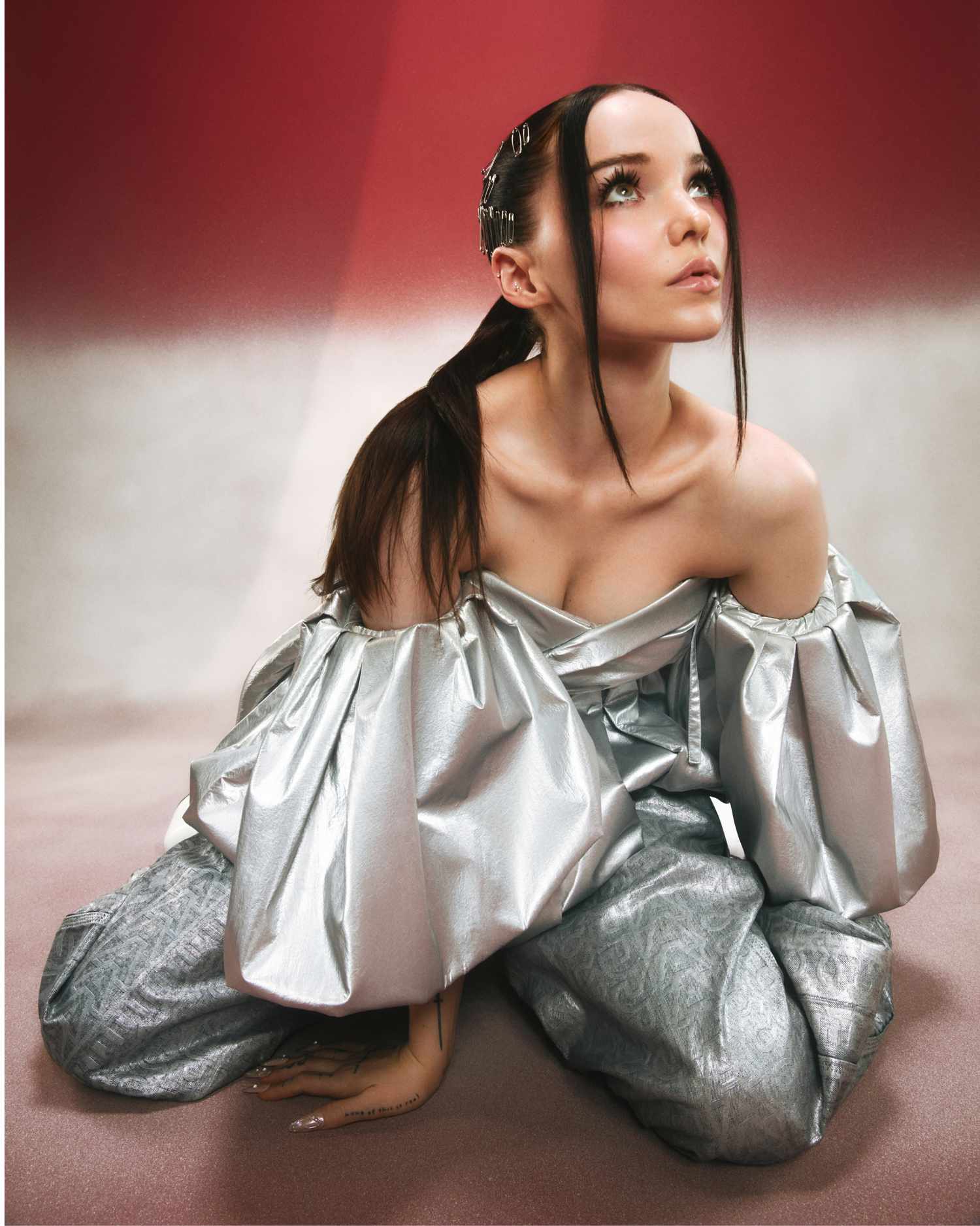
Outfit: Marc Jacobs
Her longtime fans complained she had changed too much, while others accused her of trying too hard to be “goth”. But it was just another example of Cameron’s constant evolution. She points out that, of course, she doesn’t present the exact same way she did when she was 15. ”It’s like if I asked you for your middle school or high school photos and said, ‘That’s you forever. That’s it. The end.’” She stresses she’s largely the same person she’s always been when it comes to the important stuff—her ever-changing look is just another example of her personal alchemy. She uses evolution to heal, rather than to paint a certain picture.
“Every time [I’ve made a physical change], it's been like, ‘Okay, I’ve reached some kind of emotional impasse. I need to do something new to reclaim myself. What’s that going to be today?’” Going brunette was just one of many ways that felt like the perfect reflection of her inner evolution. “People can perceive there was a big shift because I released ‘Boyfriend,’ dyed my hair brown, got a bunch of tattoos, and came out all in one eight-month period. But none of those things were related in the sense that I hadn’t planned them. It was a result of me being like, ‘Okay, I need to do this differently,’ and finding a million different ways that felt more true to me.”
Cameron is a fashion girl through and through—solidified by her new collaboration with Coach—and references both fashion house Mugler and internet tall tale Slenderman as her biggest style inspirations. These days, she prefers not to dress traditionally feminine, instead preferring to look “tall and shapeless” like Slenderman in a “massive” pair of men’s jeans and tall boots. That being said, she enjoyed dipping a toe into some more feminine-presenting looks on the Byrdie cover shoot, wearing a pleated skirt, red lipstick, and chunky femme-doll eyelashes.
“It’s fun to not really know what the next style evolution is going to be,” Cameron explains, adding that she wishes it didn’t need to be such a big topic of conversation online. ”Me coming out as queer has been something people have definitely focused on, and obviously I wrote a big song about it, so I understand that. But sometimes how you present is a huge statement, a declaration, and a reclamation of who you are,” she continues. “And sometimes, it’s just like, ‘This [style] is what I’m doing right now.’ I might be blonde again in six months. It’s just not always that serious.”

With her new album, Cameron is also entering a new musical era. “Music has been the number-one, most present thing in my life ever since I can remember,” she explains. “It was just always something that made the most sense to me. It was always a part of my plan. I just think I didn’t quite find my sound until ‘Boyfriend.’” Alchemical builds on this sound, which is darker, sharper, and more experimental than many of her previous projects, most of which have been wiped from streaming. The songs range from upbeat, ironic takedowns of L.A. party culture where she sings in an “Elmo voice” to gorgeous ballads about trauma and relationships that never could.
What started as a stage name of sorts eventually became Cameron’s legal name—“Dove” was a nickname from her late father—but she insists there’s no separation between Dove the musical artist and Dove the person. “I actually think that what I do with my music is probably my most authentic,” she says. “There’s something about words that are so limiting, and I think what’s so beautiful about writing songs is through being nonliteral, and through strings and tempo changes, you can paint this world that is actually more true to what happened, [more] than I could ever put into a soundbite or an interview.”
According to Cameron, the idea that she knew what she was getting herself into with Disney is “bullshit,” but she does acknowledge that, even at 14, she understood that there were certain inherent expectations of a Disney starlet—she compares it to an unspoken dress code, just like any other job might have. She says it’s tempting to blame the company, but she adds that she was also just a reflection of what we wanted from women in the early 2010s: ultra-polished, friendly girls next door.
Eye: KVD Super Pomade in Satellite; Lip: MAC Lipstick in Russian Red
Now, though, she’s letting go of any expectations—from fans, society, and herself—of what she has to look or sound like. “[I realized] I can exist in the world and be something that is less universally palatable. And it’s not to be controversial—in fact, I think who I am as a person has not really changed at all. It’s very funny how a little hair dye, a couple of tattoos, and wearing [fewer] pastels is like this ‘revolution.’”
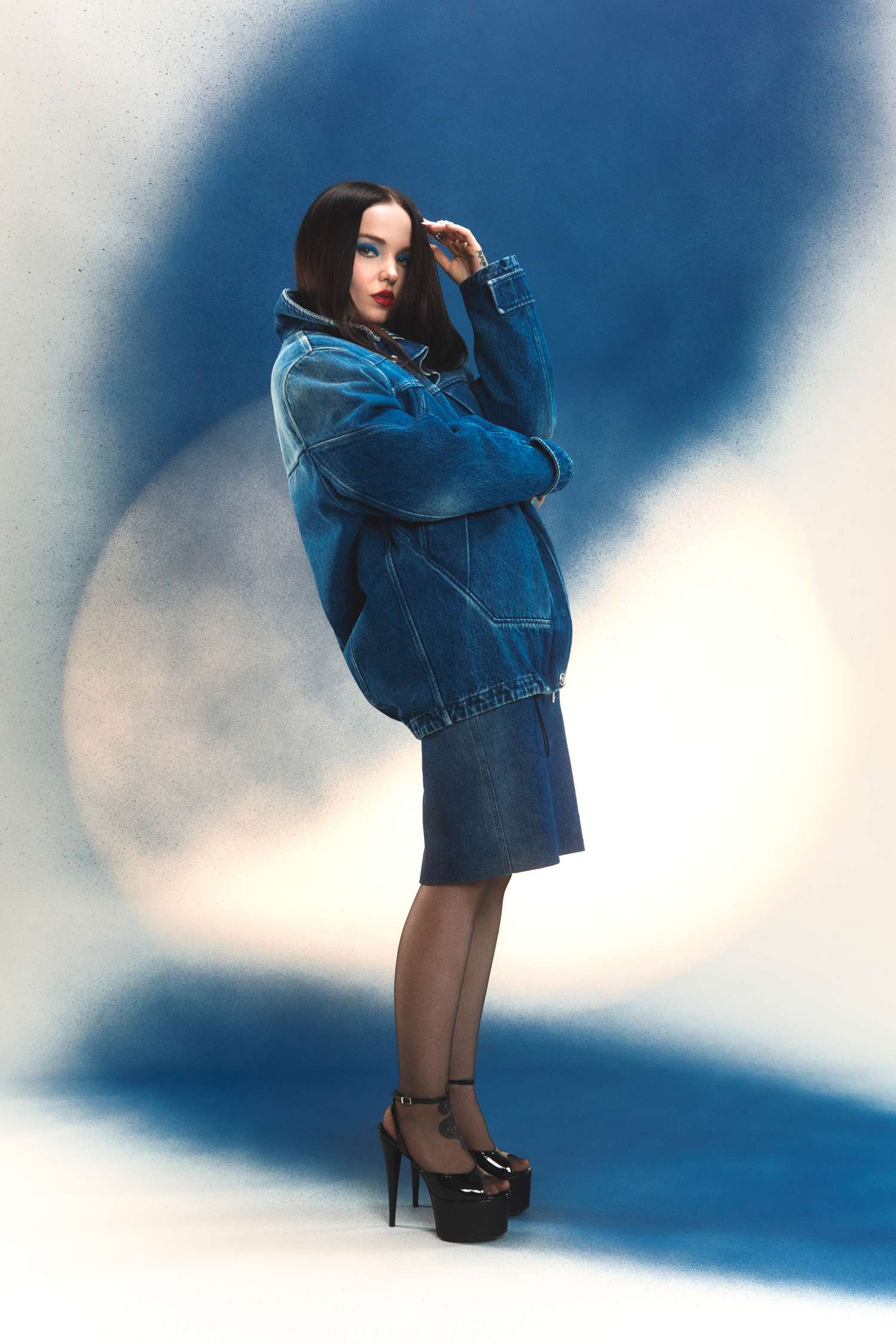
Outfit: Versace; Tights: Wolford; Shoes: Giuseppe Zanotti; Rings: Jennifer Fisher
Cameron considers herself a pop star, but she knows that moniker is loaded. “It immediately conjures up images of sparkly sequin rompers and a very specific sound, which to me, always harkens back to the 2010s.”
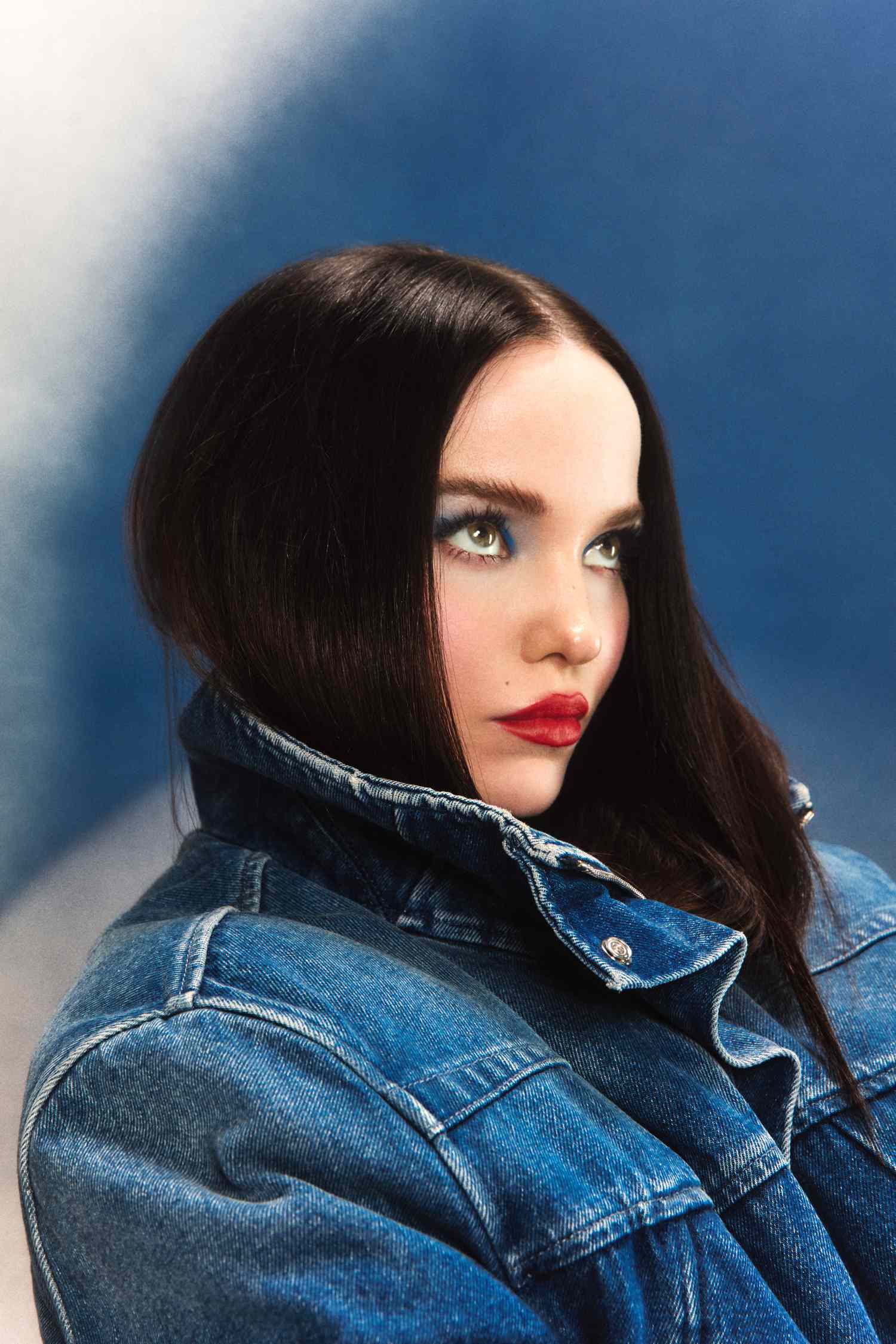
That said, in a strange way, Dove Cameron is the perfect pop star for our current moment. Her influences are wide, and most fall outside the pop-star tradition, fitting in with our increasingly fragmented media landscape. She cites experimental pop group Sleigh Bells as one of her biggest inspirations, alongside DJs Justice and Skrillex, who she discovered in underground clubs as a teenager in Seattle. She also throws out classic rock’s Cream and “dreamy” singers like Florence Welch.
Music aside, Cameron is still evolving. As an introvert who spends most of her time writing and eating microwave oatmeal, she says she still hasn’t totally adjusted to fame and being a “real pop star” post the success of “Boyfriend,” but she has learned to create a healthy balance. She understands how lucky she is but also the total mindfuck that is being famous.
Though she’s never been afraid to be open about her sexuality in her real life, she’s had to work through feelings of not being queer enough to discuss it so publicly (“I would never be so arrogant as to think my own personal relationship to my queerness outweighs the need to say something about what’s going on in the queer community”), but she’s comfortable now. Toward the end of our conversation, she opens up about mental health and the depression she’s dealt with her whole life.
Cameron’s always been open about the circumstances surrounding her father’s death and now wants to speak freely about her struggles. “I think it’s important just to say this: I’ve had times in my life when I was incredibly suicidal. And I think that needs to be destigmatized. My father [died by] suicide. I’ve spoken about that a lot. And I always think about how much shame and stigma there is around suicide. And if we could be more open about suicide and mental health, I think there would be so many people [who would say], ‘Hey, I feel like there’s no other option. Can you show me that there are?’”
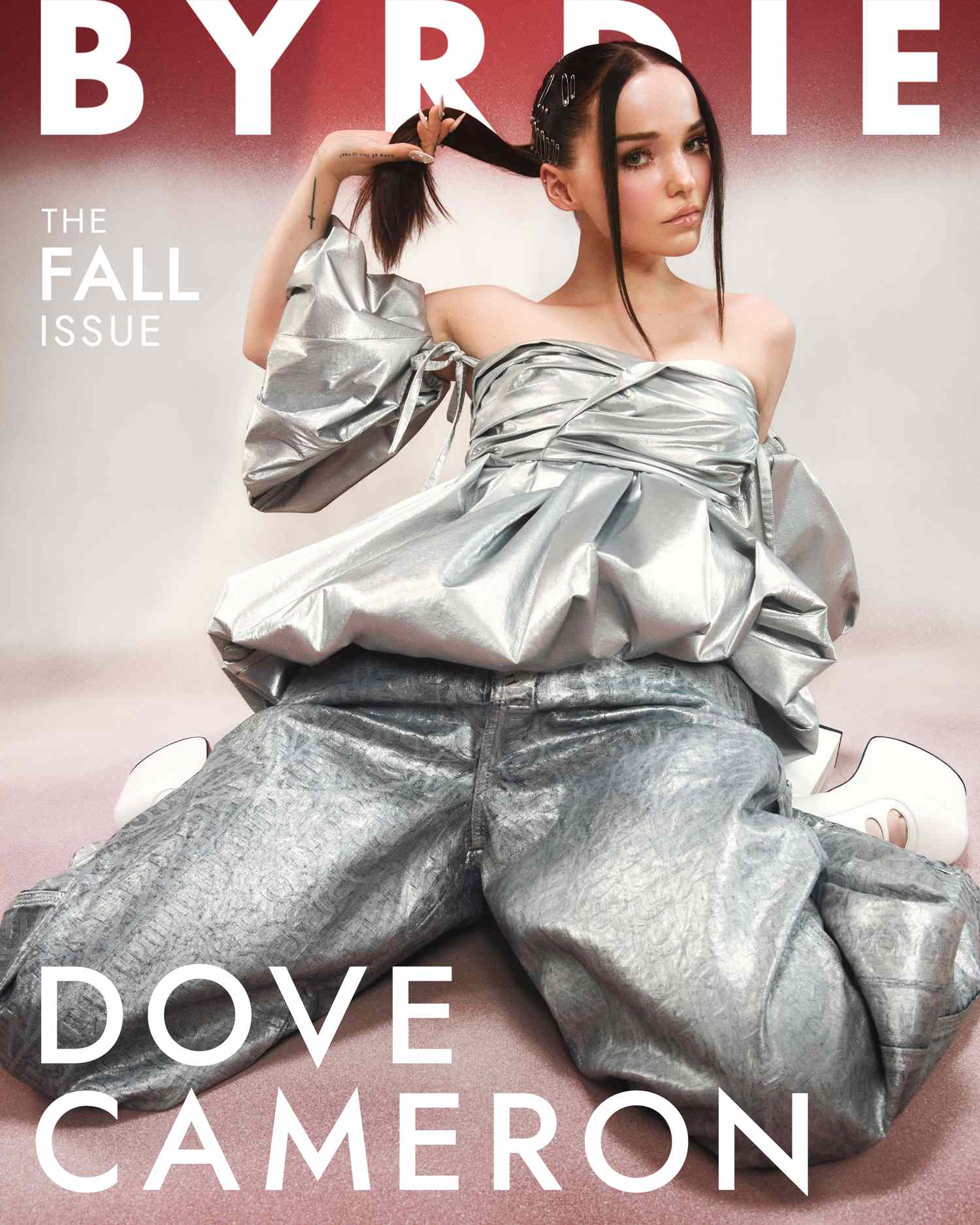
She’s still learning, but after a lifetime of trauma and pain, she’s starting to figure things out. Dove is a big believer in therapy—she’s been seeing a therapist since she was 8—and feels passionately that it should be free for everyone. Even though she knows it won’t fix all her problems, she tries to make sure the basics are covered, like leaving the house and getting some sunlight instead of staying in bed. She makes sure to see loved ones. But sometimes, she just sits in the dark in total silence and breathes “for hours on end,” letting stuff come up from the “back shelves of her brain.” (For the record, she does not recommend doing this unless you’ve done extensive therapy.)
The concept of alchemy is more than just her album name. It really is her guiding light. “I accept this huge blow, I accept this death, I accept this loss, I accept this breakup, I accept this trauma; it is now a part of me. I do not reject it, because then I’m rejecting parts of myself. And now I go forward and life is bigger and it’s expanded. I’m not recommending that you just start trying to pressure yourself to live your life that way because some days, it’s still really fucking hard. But it’s my mantra,” she says.
And, of course, there’s the music, for which she just feels excited. “I’ve released so much pressure from myself to do everything perfectly because nobody can.”
Generally speaking, there are two kinds of artists. There are those who never waver in their identity, and those who never do the same thing twice—the Madonnas, Bowies, and Gagas of the world. Though it’s too soon to say for sure, something tells me Cameron is in the latter camp. “A debut album release is, on the one hand, colossal and insurmountable and like a forever thing,” she says. “But on the other hand, it’s also a beginning. It’s a baby step toward, hopefully, what is many albums, and I’ve seen some of my all-time favorite artists start out very different here than where they are now.” I can’t wait to see where she’ll end up.
If you or a person you love is struggling, seek counseling in your personal doctor, the Crisis Text Line, or the National Suicide Prevention Lifeline.
Talent: Dove Cameron
Photographer: Leeor Wild
Beauty Direction: Hallie Gould
Creative Direction: Jenna Brillhart
Makeup Artist: Kale Teter
Hairstylist: Jacob Rozenberg / The Wall Group
Manicurist: Ashlie Johnson
Stylists: Chloe & Chenelle Delgadillo
Set Designer: Amy Jo Diaz
Assistant Camera: Derek Smith
Photo Director: Kelly Chiello
Video Director: Justine Manocherian
Production Assistant: Amanda Lauro
Booking: Talent Connect Group
:max_bytes(150000):strip_icc()/DoveCameron_LandingPage_Recirc-c12ab1292a9344cc92bdf0afbff86fda.jpg)
:max_bytes(150000):strip_icc()/dove-cameron-8e6fba1320fd4bc4bbaa6a735d18fbec.jpg)
:max_bytes(150000):strip_icc()/DoveCameron_BSides_Recirc_-fe4446e7415a423ebb42a877be6ed2eb.jpg)
:max_bytes(150000):strip_icc()/Byr_CharlotteGirlFall_LeadRecirc-7c2a866d138a486da6db592b27aa1f8e.jpg)
:max_bytes(150000):strip_icc()/8-Press-On-Nails-3f6436a937ec49b6ab55484180347e33.jpg)
:max_bytes(150000):strip_icc()/fall-slouchy-bag-trends-aab6aba3cb9d453590a2e09f5f2d93eb.png)
:max_bytes(150000):strip_icc()/Byr_BraidedPigtailTrend_LeadRecirc-103add69dca64c258736e06043e8e001.jpg)
